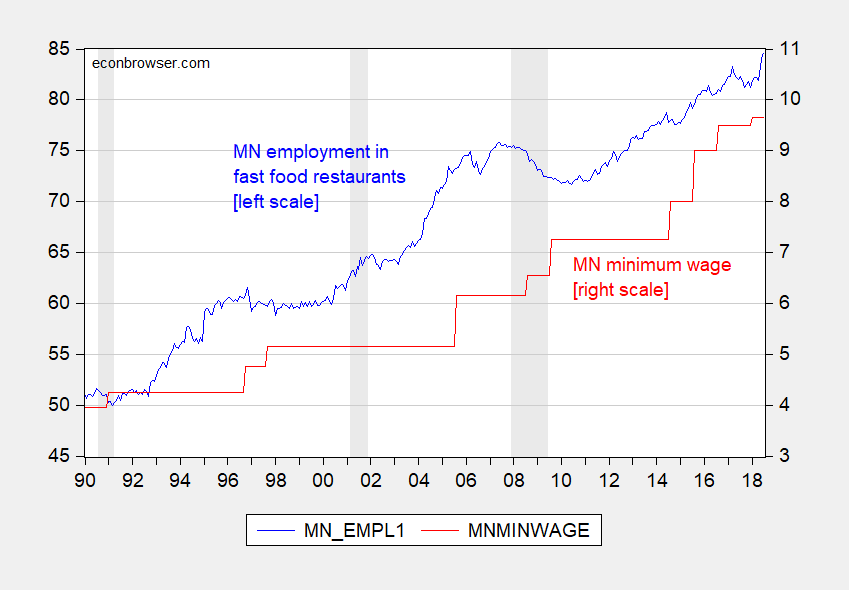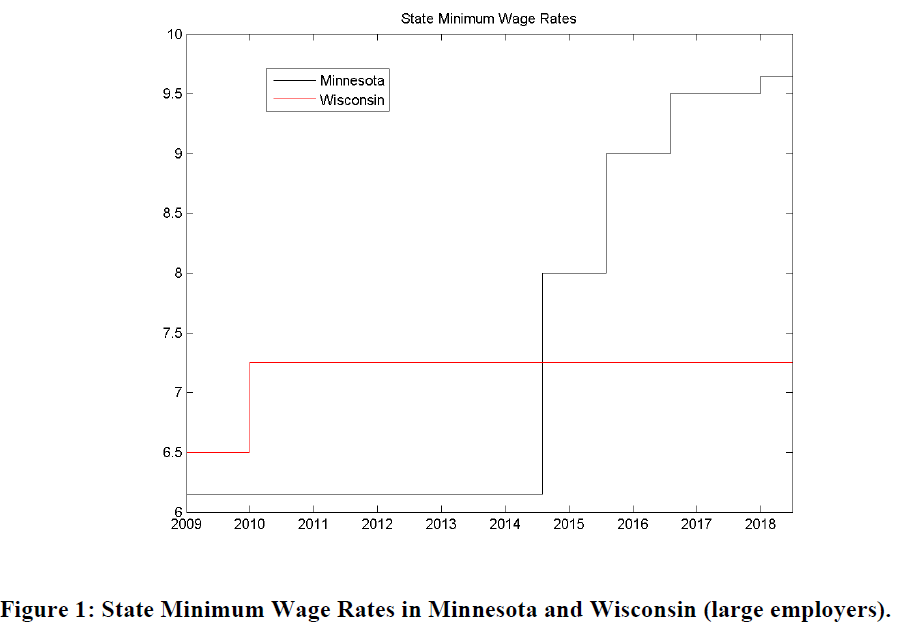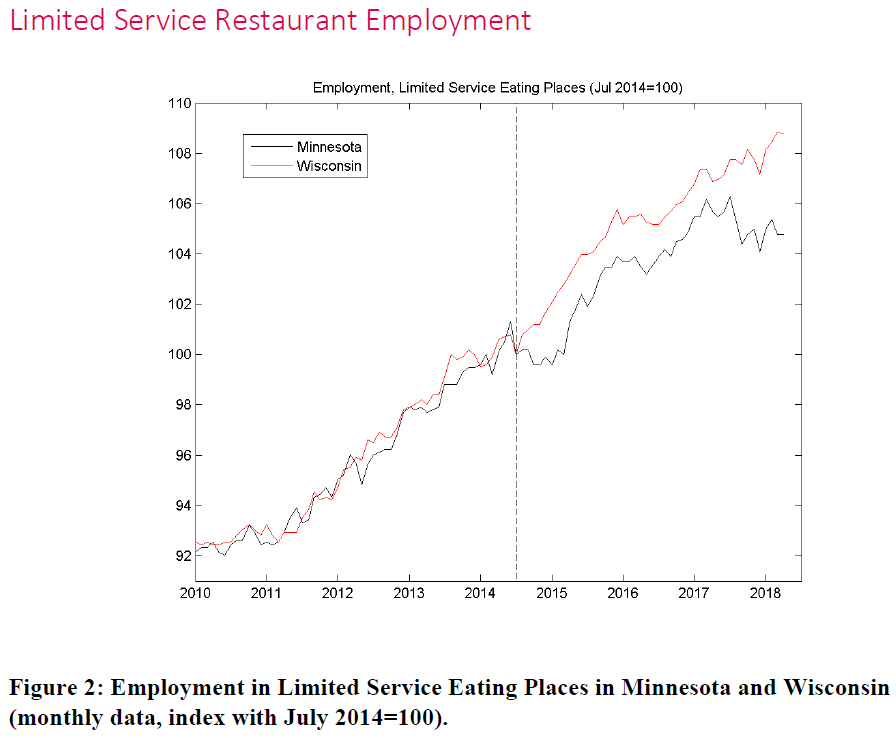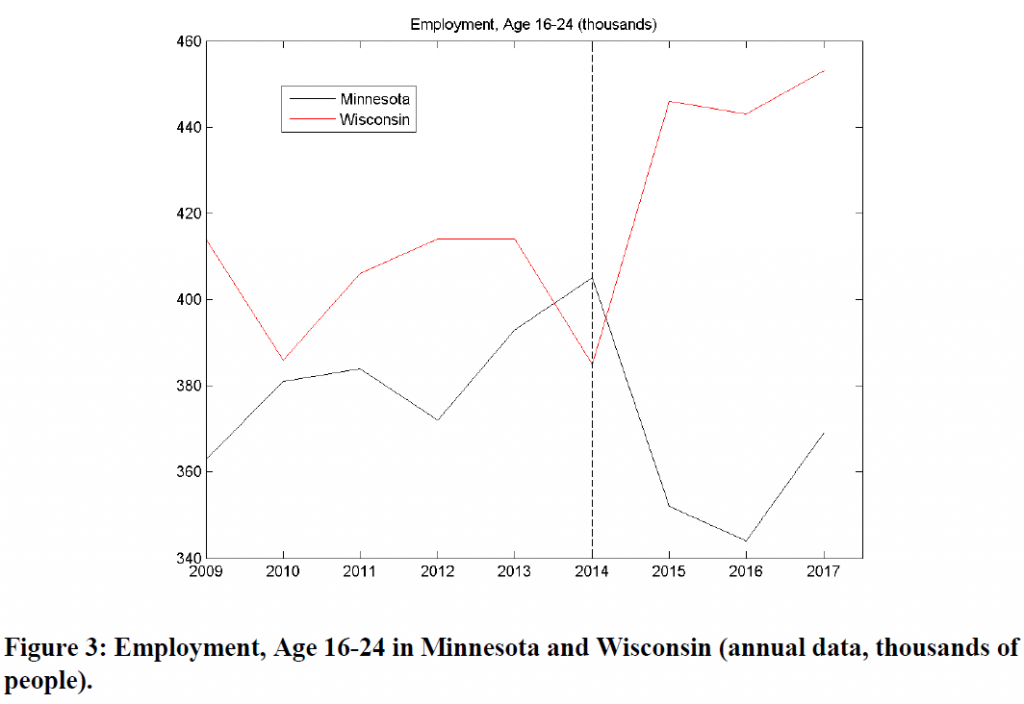- Is the partial derivative of fast food employment with respect to the minimum wage negative? Maybe, maybe not.
- Does a higher minimum wage decrease young adult employment? Maybe, maybe not.
- Does a higher minimum wage raise fast food restaurant prices? Not noticeably.
These conclusions (reported in this working paper written by Louis Johnston and me) stand in contrast to those obtained by Noah Williams, and reported in this CROWE Policy Brief.
If one saw the following battery of graphs provided in the Policy Brief, one could plausibly think the answers to all three questions were unambiguously “yes”.
Well, the temptation to do “ocular regressions” is why academic economists do econometrics.
Let me elaborate. A paper critically influential to my education as an economist was Ed Leamer’s “Let’s take the con out of econometrics” (published in the American Economic Review, if you were curious):
…an inference is not believable if it is fragile, if it can be reversed by minor changes in assumptions.
In this regard, those plots of data shown in Figures 1-4 from Williams (2018) implicitly assume no other variables are important, or sufficiently important, to overturn the correlations. If the correlations break down with minor variable additions, or changes in assumptions of stationarity, then the conclusion that changes in the minimum wage “cause X” is fragile. Also, if investigating a longer sample casts doubt on strong relationships, then one should be extra wary:

Figure 1: Employment in limited service restaurants, in thousands (blue), and MN minimum wage, in $/hr (red). NBER defined recession dates shaded gray. Source: BLS, NBER, and author’s calculations.
If you can see an obvious systematic relationship between minimum wage and fast food restaurant employment in this long span of data, you have greater powers of detection than I. (I say the same, even if you deflate the minimum wage by the CPI.)
In Chinn and Johnston (2018), we express Minnesota variables relative to Wisconsin. If there is a nationwide trend in, for instance technical efficiency in fast food restaurants, that is common to Wisconsin and Minnesota, then expressing in relative terms partially accounts for this omitted factor.
Minimum wage levels are also not random. In particular, states sometimes adjust minimum wages depending on general macro or labor market conditions. Wisconsin’s failure under Governor Walker and the Republican controlled legislature to raise minimum wages is probably in part due to the lackluster labor market conditions in the state (see here), relative to that in Minnesota. Hence, one might want to control for labor market conditions. For fast food restaurant employment, the opportunities in the rest of the labor market is a potentially omitted variable in Figure 2 (accounting for leads to inconclusive results). For youth employment, total labor force is an implicitly omitted factor in Figure 3. For fast food restaurant costs, trends in the production function are an omitted factor.
It turns out that accounting for these factors in regression analyses leads to the answers to the questions posed at the beginning of this post.




I’m in a better mood than I should be. Been watching the return episodes of “Twin Peaks” (2017) in my usual night owl hours. That stuff is addictive. Though I would still prefer a bottle of bourbon or some rotgut vodka with some fruit juice.
@Menzie I have given up on the state I reside in making a more intelligent choice than going with a mortgage/loan fraudster. I am 100% certain they will go with Stitt Bank your last dime on a Kevin Stitt victory—just don’t loan your winnings as collateral on a mortgage loan with Stitt, or you’ll end up calling a cardboard box your home. If I focus on that I will go into depression, so I have decided tomorrow to focus on your Wisconsin Governor’s race as my personal beacon of hope. That gray-haired nerdy egghead bastard Tony better not let me down.
https://www.theatlantic.com/magazine/archive/2018/01/iron-chefs/546581/
Maybe… maybe not.
So a few things in the CROWE paper that struck me as strange and probably more interesting then the issue of the minimum wage itself. The most obvious weird thing is Figure 5 showing the path of annual wages. If MN and WI had the same effective minimum wage prior to 2014, then why was average annual pay less in MN than in WI? The obvious candidate would be that employers in MN offered fewer hours even though the per hour wage was the same. But then we see average annual pay in MN increase after 2014, which is expected. But I would have expected it to increase as a level shift, not a change in the slope. That just seems very strange. And what was the effect of a higher minimum wage on overtime hours? Remember, employers tend to look at the total wage bill for the month that’s required to cover hours of business. That means a higher minimum wage doesn’t necessarily mean a higher weekly wage bill if overtime hours are reduced. A useful chart would have been the number of nonsupervisory hours worked after the minimum wage went into effect. Intuitively we would expect an increase in the minimum wage to result in a trade-off between the fixed costs of hiring a large part time high turnover workforce against the costs of higher a smaller but higher paid workforce.
As I suspect the authors would agree, the discussion on the effect of the minimum wage on restaurant prices is a good deal less than satisfactory. The employment data is restricted to limited service fast food joints, but the price data effectively covers all classes of restaurants. Nothing in that discussion tells me anything useful.
The paper also fails to tell us what happened to overall limited service sales between the two states. How do we know that employment in limited service restaurants didn’t fall because McDonald’s closed a bunch of underperforming stores due to changes in customer tastes?
But the biggest question for me is about the effect on other occupations. If labor is a substitute for capital in limited service sector fast food places, then we would expect to see fast food places in MN going to more capital intensive approaches. We see that with a lot of virtual self-service fast food restaurants. But making a fast food place more capital intensive should increase wages and employment in manufacturing and computer programming occupations.
Perhaps the labor content is far smaller than what could be expected.
It’s early Tuesday afternoon and the .xls file page is not working. I suspect this is related to University website issues, and not the .xls file itself. In which case if I retry in 2-3 hours maybe the .xls file page will be back up. I’ll try it again later today and report back here. This has been Less Nessman with the helicopter traffic report.
Moses Herzog: Apologies, I forgot to actually upload the file. It’s online now.
Your blog is a great service Menzie, that you take your own time to educate non-tuition paying goofballs like me, no need apologize. Thanks for fixing it. You’ve set the bar very high for yourself, so we have to take these chances to rib you when we can : )
Remember when Gov. Walker made that deal with Foxconn to increase employment in Wisconsin? Well it looks like Foxconn will bring Chinese workers to Wisconsin to fill those jobs!
https://www.wsj.com/articles/foxconn-considers-bringing-chinese-personnel-to-wisconsin-as-u-s-labor-market-tightens-1541505600
Hey – Aaron Rogers just hopes they are Packer fans!
pgl,
So, if Foxconn hires Wisconsin workers, it’s proof that Walker did a lousy job addressing unemployment because there were so many people available for the jobs. But if Foxconn brings in Chinese workers, it’s proof that Walker did a lousy job because there weren’t enough available Wisconsin workers to fill the jobs.
Okaaay.
Bruce Hall: Whatever you think of WI labor market conditions, it hardly seems a good idea to for WI state to exorbitantly subsidize employment of Chinese nationals, while cutting spending for K-12 and college education, don’t you agree.
bruce, why would you believe a success is when the state of wisconsin spends BILLIONS of dollars to support chinese employment? if employment in the state was so great, why the need to spend ADDITIONAL money on employment to begin with? this smells of either really stoopid policy or crony capitalism at its worst. you disagree bruce?
Menzie and Baffling, I think you may be parsing the situation. The original deal was tax abatement for Wisconsin residents’ jobs. As pgl points out, there seems to be a lack of available Wisconsin residents for the jobs so to get the project going, Foxconn proposes to bring in Chinese nationals to fill the jobs that Wisconsin residents can’t (won’t?). So, no, tax abatement for jobs not going to Wisconsin residents seems unwise. Obviously, Walker should have done a poorer job reducing unemployment so that more Wisconsin residents would be lining up for the Foxconn jobs.
As for the education budget issues, I’m not an expert in that area. One group argues that most of the cuts were in non-operational areas: http://www.maciverinstitute.com/2018/10/the-truth-about-education-spending-in-wisconsin/. I don’t know anything about the MacIver Institute so I’m sure you can (and will) provide rebuttals, if necessary.
State aids to schools are at the highest level of actual dollars in history. When accounting for inflation, those dollars dip below prior year investments when taking a traditional view of state aids as a line item. Yet, not accounted for in that metric is the savings to districts that they can now make, if they choose, through the tools of Act 10. Those savings add up, to the tune of $3.2 billion in just five years.
For the sake of the conversation, let’s use the same benchmarks. Consider that taxpayers’ dollars now go further in the classroom, since public employees contribute slightly more to their own health expenses. Consider, too, that the stimulus package offers a nice federal padding for high spenders to point to.
The state can’t force school districts to reform themselves, which explains why numerous districts still don’t require employees to pay any monthly premiums toward health insurance costs. At the same time, budgets are finite. Taxpayers do not have bottomless wallets – if they did, the population exodus from Illinois wouldn’t be so big. That school districts can now free up more dollars for classrooms is a good thing.
The more prominent an issue becomes, the likelier it is that misinformation spreads. That’s especially true for as complex an issue as school financing. We hope that this fact check helps elevate the debate.
But, hey, this is all moot. Walker lost.
Bruce Hall: See the top notch analytical/counting skills of MacIver here.
I just caught a faint whiff of subtle sarcasm in the air:
https://www.politifact.com/wisconsin/statements/2013/apr/17/maciver-institute/maciver-institute-says-wisconsin-gov-scott-walker-/
Menzie, so wrong on one thing, wrong on everything?
I’m not sure looking at a 2013 statement on employment gains has anything to do with a current look at school spending. I would think you’d want to respond to the assertions made about the impact of Act 10 on overall school finances since you raised the point that school finances are in the tank.
But, as I said, this is all moot.
Bruce Hall: No, but there are multiple instances of MacIver doing crazy things (from an analytical sense, not a strategic disinformation sense). Several documented on Econbrowser, will dig them up for you. Like a small Heritage Foundation, but less competent.
“Obviously, Walker should have done a poorer job reducing unemployment so that more Wisconsin residents would be lining up for the Foxconn jobs.”
it is either stooopid policy or crony capitalism. you are trying to dance around this fact, rather than acknowledge the truth. bruce, your statement is heading down the path of rationalizing the illogical.
“The state can’t force school districts to reform themselves, which explains why numerous districts still don’t require employees to pay any monthly premiums toward health insurance costs.”
requiring employees to pay a monthly premium has absolutely nothing to do with reform, unless you believe that making cuts to salary is what you mean by reform. the benefit is simply one component of total compensation. and last time i checked, across the nation on average, educators are underpaid based on their qualifications and importance of work. instead, we overpay bankers to lead us into a financial crisis as they pilfer the coffers. need a new set of priorities.
baffling,
Since we veered off the subject of minimum wage to school funding (per Menzie’s comment), perhaps a real life Wisconsin example of “breaking the paradigm” is appropriate.
https://www.gazettextra.com/opinion/our_views/our-views-a-debt-free-walworth-county-is-an-inspiration/article_c5912788-e1ba-5156-be53-8d9de371ac3b.html (you ought to spend a few minutes to at least read this before you offer a rebuttal).
In our local election, voters approved of a new bond issue that was designed to not increase taxes while reducing the overall debt level by retiring old, more expensive bonds with funds from the new bonds. At the same time, the funds could also be used for improvements to the schools (including replacing one older school with a new one).
Bruce Hall: I didn’t bring up school funding.
Menzie,
So, you are saying that the MacIver analysis of school funding is totally wrong? If not totally wrong, what are the wrong parts? And if there are wrong parts, does that vitiate the conclusions?
I sense that there is more to this than disagreeing with some past statements from MacIver. You can also refer to my response to baffling.
School financing can be a bit more sophisticated than 1) tax more; 2) spend more.
Menzie,
I may have misinterpreted your comment: https://econbrowser.com/archives/2018/11/time-series-evidence-on-the-minimum-wage-impact-in-minnesota-vs-wisconsin#comment-218502
Bruce Hall: Whatever you think of WI labor market conditions, it hardly seems a good idea to for WI state to exorbitantly subsidize employment of Chinese nationals, while cutting spending for K-12 and college education, don’t you agree.
“Since we veered off the subject of minimum wage to school funding (per Menzie’s comment), perhaps a real life Wisconsin example of “breaking the paradigm” is appropriate.”
well you are correct bruce, you certainly veered off topic. that opinion piece really had nothing to do with my comments to you. unless you think it is an example in support of walker’s fiscal giveaway to foxconn? or perhaps you mean that schools should simply stop paying teachers as a means to improve their cost structure?
Not getting too close to get a random elbow in this gentlemanly debate, I wanted to say sometimes, IMHO, Menzie has occasional moments of rhetorical genius (expressing himself at a high level). I took particular joy in this turn of phrase:
“MacIver doing crazy things (from an analytical sense, not a strategic disinformation sense).”
“…….not from a strategic information sense” Menzie, my brother, you have NAILED it once again. Utterly and without qualification NAILED it. And the names AEI, Cato Institute, and Hudson Institute also come to mind. Let’s not forget the Economics Department at George Mason U, which is an absolute joke, and has to have all it’s economic research filtered through the Koch Brothers propaganda machine. The only one of these conservative groups which MAYBE deserves some respect is Hoover Institution, and even that is debatable. Possibly they are the closest thing to a Brookings for “the right”.
Also it’s quite odd to see Bruce Hall defending the American government (state or federal) subsidizing foreign workers’ jobs. I’m wondering how that gets calculated in the MAGA plan for lowering the trade deficit?? I’m certain only Bruce Hall’s mental gymnastics to defend Scott Walker could make that math work.
How is comparing the asininity of state government subsidizing foreign workers with the better choice of improving worker skills and worker knowledge of native citizens (through public education) “veering off subject”?? I feel certain once again, that only Bruce Hall could explain how making relative comparisons of the use of government money is “veering off subject”. Perhaps anything which shows the asininity (and batshit craziness) of arguing for state government subsidization of foreign workers to improve the state economy is what Bruce labels “veering off subject”??
Sometime in the last century both my older brothers worked for a Taiwan Job Shop in Silly Con Valley. The story was the engineers were Americans and all the assembly workers were Chinese “Trainees”. “Trainees” that were replaced with another group of “Trainees” on frequent rotations” One of the “Trainees offered to be the factory night watchman if he could sleep at the factory. Remember the valley has been a very high rent district for a long time. He was told OK as long as he paid rent.
I live in this Silly Con Valley (love that line) for a year. Hated it but then I got to move to San Fran!
As of 6:30 pm central time. “538” is projecting Democrats gain 37 seats in the House. So it’s going to be very interesting to see how reality shakes out with that prediction. Nate Silver has some respect to gain back (in my book anyway) after his Hillary near guarantee F- UP, circa 2016. I’ll be watching stuff mostly online tonight, outside of the occasional spot-check with TV journalism living legend Judy Woodruff. I’d watch her the whole evening only my tolerance for stomach nausea with David Brooks can only hold out so long.
Wondering if one of our better read commenters on this site, pgl, would enjoy this cartoon??
https://twitter.com/BillBramhall/status/1059907415242629120
You know how I found that cartoon?? I follow one of the greatest ladies in American print journalism:
https://twitter.com/ZivaBranstetter
She works at Washington Post. Why don’t you guys follow her too??
That was FUNNY! Thanks!
Kids!!!!! You’re not going to believe this, but it’s true. BELIEVE ME!!!! I found stealthily taken video, kept top secret up to now, of Menzie trying to find conclusive empirical proof that a higher minimum wage lowers employment.
https://www.youtube.com/watch?v=rJWLdQ9vylA
I could tell you how we got this covert video of Menzie, but then it could be reverse engineered to commit evil.
(I know Menzie works hard and arduously on his research and does math calculations I could only dream to have the brainpower to do, the above is just meant to induce laughter, not in any way to trivialize Menzie’s hard work)
Dear Prof. Menzie,
I have two quarries, 1) did you compare your result with similar states (for example, similar in geographic structure or economic structure)? and 2) did you have any comparison on mark-ups firms are charging before and after the minimum wage increase?
Syed
Syed Uddin: I calculate some indices of similarlty in this post. MN and WI are pretty similar.
I did not compare econometrically the other states against MN. We may follow up.